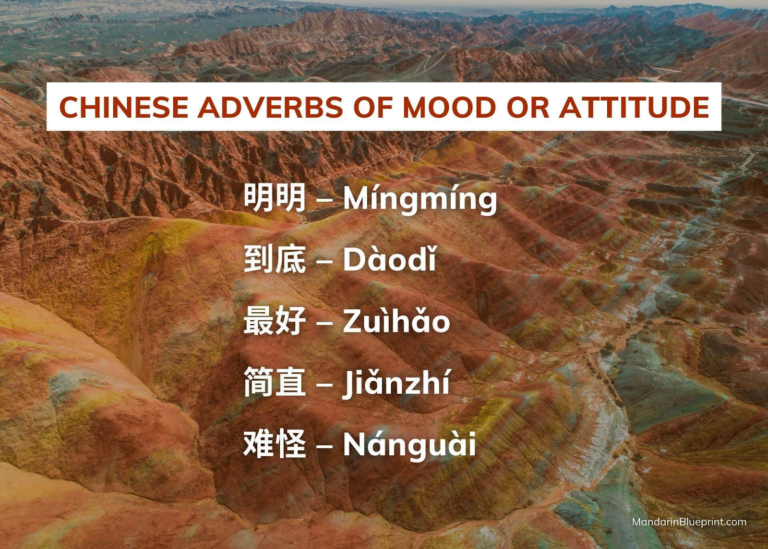Chinese Adverbs of Mood or Attitude

Welcome to the world of Chinese adverbs of mood and attitude. They’re important to get right, as you can use them for a whole new linguistic world for Chinese learners.
Tone adverbs in Chinese are used to express the speaker’s feelings, attitudes, or perspectives regarding the statement being made. They can convey a range of emotions and stances, such as doubt, certainty, surprise, urgency, or emphasis.
Unlike adverbs of manner that typically precede the verb they modify, Chinese adverbs of mood and attitude can appear in different positions in a sentence, depending on what they modify and the emphasis desired. They can be placed at the beginning, in the middle, or at the end of a sentence, altering the overall tone and mood of the statement.
The inclusion of a tone adverb can significantly change the interpretation of a sentence. These Chinese adverbs can add layers of meaning, such as softening a command, introducing a level of politeness, expressing scepticism, or strengthening an assertion.
The following adverbs are integral to mastering the communicative aspects of Mandarin, as they contribute significantly to conveying nuanced meanings and emotional undertones.

明明 – Míngmíng
明明 (Míngmíng) is used to underscore the clarity or obviousness of a situation or fact. It translates to “obviously” or “clearly” in English and is used to emphasize that something is evident or unmistakable from the speaker’s point of view.
This Chinese adverb is often employed in situations where the speaker wants to stress the apparent nature of a fact or circumstance, sometimes in contradiction to what others might believe or say. For instance, in the sentence “你明明不会做,为什么还要装样子” (Nǐ míngmíng bùhuì zuò, wèishénme hái yào zhuāngyàngzi? — “You obviously don’t know how to do it, so why bother pretending?”), 明明 (obviously) emphasizes the speaker’s perception of the other person’s lack of ability, contrasting it with their pretence or denial.
In Mandarin sentences, 明明 can be placed at the beginning of a statement to set the tone for the entire sentence. It serves to assert the speaker’s perspective right at the outset, establishing the context for what follows.
The use of 明明 often implies a contradiction between what’s evident and what’s being claimed or shown by others. It can express frustration, disbelief, or challenge towards a situation or someone’s actions or statements.
For learners of Mandarin, understanding the use of 明明 is essential for grasping how native speakers convey nuances of certainty, evidence, and contradiction. It’s an example of how Mandarin uses adverbs to enrich communication with emotional and attitudinal layers.
Related Reading: If in Chinese: Conditional Statements
到底 – Dàodǐ

This is a tricky one to translate directly into English. 到底 (Dàodǐ) literally translates to “to the bottom” or “to the end,” but its use in conversation often goes beyond this literal meaning. It’s frequently employed to express a need for definitive clarity or to question the underlying reason or truth behind a situation.
This adverb is commonly used as a marker of the speaker’s frustration, impatience, or desire for an explanation. It adds emphasis to questions or statements, indicating that the speaker is seeking a clear, conclusive answer or reason. In the sentence “你那样干到底是为什么?” (Nǐ nàyàng gàn dàodǐ shì wèishénme? — “What the hell did you do that for?”), 到底 (Dàodǐ) conveys the speaker’s frustration and need for an explanation.
While 到底 can sometimes translate to phrases like “after all” or “in the end,” its usage in Mandarin often carries a stronger sense of probing or questioning. This can make direct translation into English challenging, as the word encompasses both the quest for understanding and an emotional component of urgency or frustration.
In Chinese culture, where indirect communication is often preferred, the use of 到底 can be a way of strongly expressing a need for honesty or transparency in a situation. Its use often indicates a point of significant concern or impatience.
For learners of Mandarin, understanding the context and emotional weight of 到底 is important. It’s a powerful tool for emphasizing the need for clarity and can be effective in expressing frustration or urgency in a conversation.
最好 – Zuìhǎo
最好 (Zuìhǎo) is a versatile phrase in Mandarin Chinese that can function as both an adjective and an adverb, each with distinct uses and connotations. Let’s explore its role as a Chinese adverb, which translates to “you’d better” or “it would be best.”
As an adverb, 最好 (Zuìhǎo) is used to give advice or suggest the best course of action in a given situation. It often carries a sense of strong recommendation or urgency, implying that the suggested action is the most preferable or advisable.
In sentences like “你最好坐车吧” (Nǐ zuì hǎo zuòchē ba — “You’d better go by bus/train”), 最好 (Zuìhǎo) is used to offer advice or an opinion, suggesting that taking a bus or train is the best option for the listener under the circumstances.
The tone and context in which 最好 (Zuìhǎo) is used can significantly influence its interpretation. While it can be a friendly suggestion, it may sometimes carry a condescending or imperative tone, almost like a warning or strong advice.
For instance, “你最好今天把它搞完” (Nǐ zuì hǎo jīntiān bǎ tā gǎo wán — “It would be best if you finished it today”) can sound like an implicit warning, suggesting that not completing the task could have negative consequences.
The use of 最好 can be a tactful way to give strong advice without direct confrontation. However, depending on tone and context, it can also convey urgency or an implicit warning. Its tone can vary from polite to more assertive, depending on the context and intention of the speaker.
For learners of Mandarin, understanding the context and tone associated with 最好 is important. It’s one of the most useful Chinese adverbs of attitude for giving advice but requires sensitivity to context to avoid misunderstandings or conveying unintended condescension.
Related Reading: 着 zhe in Chinese: The Aspect Particle
简直 – Jiǎnzhí
The Chinese adverb 简直 (jiǎnzhí) is a versatile word that adds emphasis to a sentence, similar to expressions like “simply” or “absolutely” in English. 简直 (jiǎnzhí) is used to emphasize the statement that follows it. It conveys a strong sense of certainty or intensity, indicating that something is unquestionably true or in a particular way.
It’s usually used when expressing surprise, disbelief, or exaggeration about a situation or statement, intensifying the emotions or reactions associated with the statement and making it more emphatic.
For example, you might use it to say 我简直不敢相信! (Wǒ jiǎnzhí bù gǎn xiāngxìn!) — I simply can’t believe it! Alternatively, you can use it for exaggeration purposes, such as 他的好心简直到了无法形容的地步。 (Tā de hǎoxīn jiǎnzhí dàole wúfǎ xíngróng de dìbù.) — His kindness is beyond description.
简直 (jiǎnzhí) is one of the more powerful Chinese adverbs of attitude that adds emphasis, intensity, and a sense of certainty to a statement. It’s commonly used to express surprise, exaggeration, or strong emotions. When used in a sentence, it heightens the impact of the message and underscores the speaker’s conviction or amazement.
难怪 – Nánguài

The Chinese adverb 难怪 (nánguài) is a useful expression that conveys the idea of “no wonder” or “it’s not surprising.” It’s employed to indicate the speaker’s understanding or acknowledgement that a particular situation or outcome is expected or logical.
难怪 (nánguài) is used when the speaker wants to acknowledge that they understand why something happened or why someone feels a certain way. It suggests that the situation being discussed is entirely reasonable, given the circumstances or facts presented. It can also serve as a way to justify or explain an occurrence without expressing surprise or criticism.
For example, if someone is feeling tired after recently waking up, you might say 你走了这么多小时,难怪你累了。 (Nǐ zǒu le zhème duō xiǎoshí, nánguài nǐ lèi le.) — You’ve been walking for so many hours; no wonder you’re tired.
You can even use it to state the obvious, such as 他得了重感冒,难怪他嗓子疼。 (Tā déle zhòng gǎnmào, nánguài tā sǎngzi téng.) — He has a severe cold; no wonder his throat hurts.
难怪 (nánguài) is one of the most versatile Chinese adverbs of attitude, as it allows speakers to acknowledge and understand why a particular situation or outcome occurred. It is a way of saying “no wonder” and provides an explanation or justification for the observed circumstances without expressing surprise or criticism. It’s a useful expression for expressing empathy or understanding in various contexts.
Harness the Power of Mood and Attitude in Chinese
In the world of Chinese adverbs of mood and attitude, we’ve explored how these unique linguistic elements shape Mandarin’s emotional and attitudinal landscape. From the certainty conveyed by 明明 (Míngmíng) to the urgency of 到底 (Dàodǐ), Chinese adverbs play a pivotal role in enriching communication.
These adverbs aren’t just words; they’re the keys to unlocking a deeper, more nuanced understanding of Mandarin. They enable learners to express a range of emotions and attitudes, vital for effective communication in any language, particularly in Mandarin, where subtlety and nuance hold significant cultural value. The question becomes, though, what next?
Do you want to learn Mandarin faster and easier? The key lies in mastering these subtle yet powerful aspects of the language. Each adverb you learn opens up new avenues for expression, allowing you to convey not just information but your feelings, attitudes, and perspectives with clarity and confidence.
Understanding where you stand in your Mandarin learning journey is crucial. That’s why we offer the FREE Mandarin Fluency Scorecard. This tool provides an assessment of your current skill level and a personalized guide to achieving fluency in less than a minute. By identifying your personal weaknesses and barriers to fluency, you’ll discover the next steps tailored to your current level.
The Mandarin Fluency Scorecard doesn’t just tell you where you are; it shows you where to go next. You’ll receive a custom report with immediate, actionable steps to enhance your learning. Whether it’s focusing on Chinese adverbs of mood and attitude or other aspects of the language, this tailored guidance is invaluable.
Embrace this opportunity to deepen your understanding of Mandarin and accelerate your journey to fluency. Complete the Mandarin Fluency Scorecard today — it’s free, fast, and tailored just for you. Discover your path to mastering Chinese adverbs of mood and attitude and beyond.
By integrating these powerful Chinese adverbs into your Mandarin repertoire, you improve your linguistic skills and gain insights into Chinese culture and thought patterns. Remember, fluency isn’t just about vocabulary and grammar. It’s about embracing the mood, tone, and attitude that make a language truly come alive.








